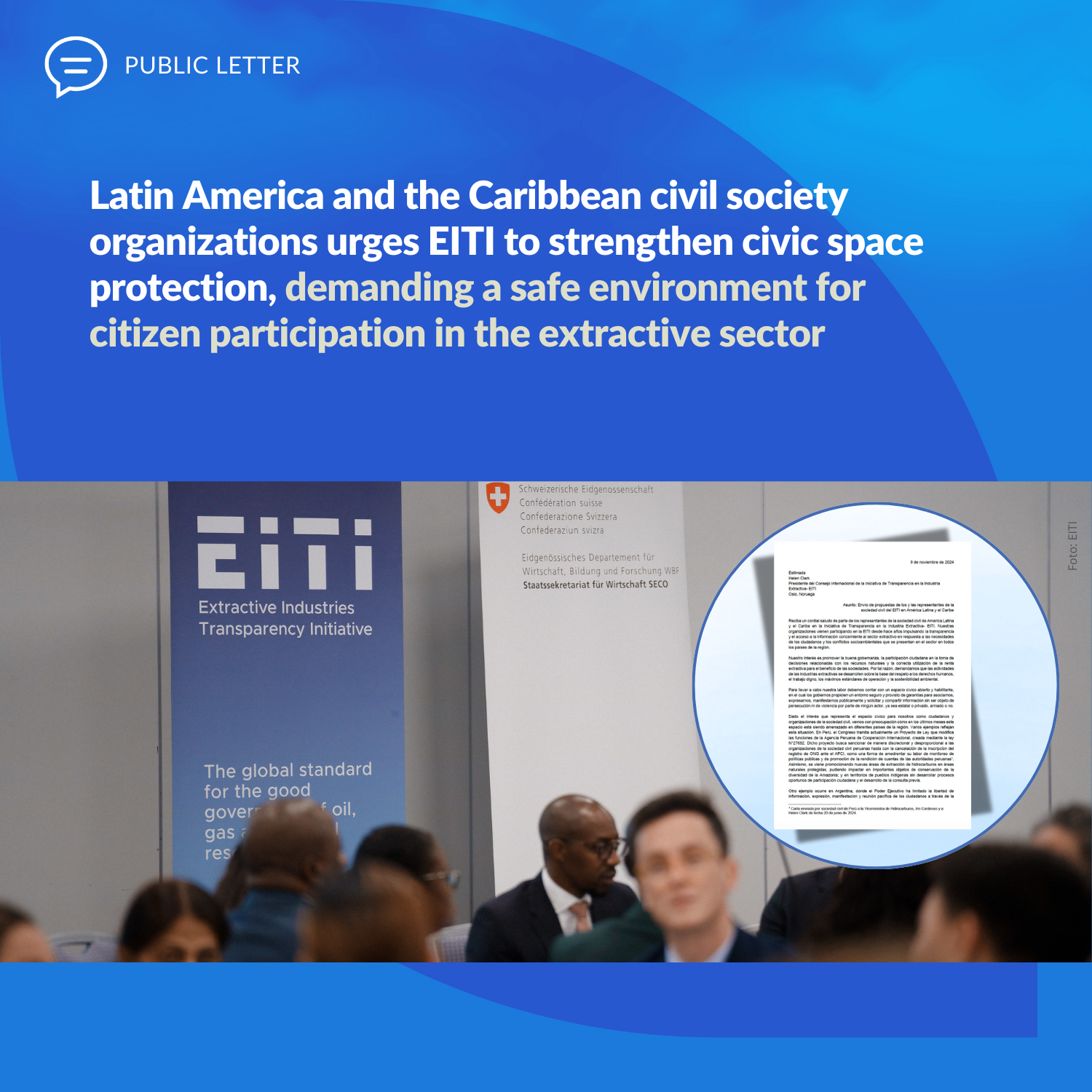Wednesday, November 13, 2024 – On November 9, more than 40 civil society organizations from Latin America and the Caribbean that participates in the Extractive Industries Transparency Initiative (EITI) sent a letter to Helen Clark, Chair of the Initiative’s International Board, urging the entity to take action to ensure that member countries provide an open and safe civic space, in line with the Initiative’s Standard.
The communication highlights how the civil rights and freedom of association environment in the region has been severely eroded in several countries, hindering active citizen participation in decision-making related to the extractive sector.
The signatory civil society organizations from Peru, Colombia, Mexico, Guyana, Suriname, Ecuador, Chile, Argentina, Honduras, Guatemala, and the Dominican Republic participate in the EITI, promoting transparency and access to information on the extractive industry. However, they express deep concern about increasing threats in their countries toward those who defend transparency, environmental justice, and natural resource governance.
The letter details several specific, concerning cases. For example, it notes that in Peru, Congress approved a bill to amend Law N.° 27692, which created the Peruvian Agency for International Cooperation (APCI). If implemented, this would allow the government to arbitrarily penalize civil society organizations, threatening their legal status as a way to deter oversight and accountability efforts.
Additionally, the letter addresses the Peruvian government’s insistence on promoting areas for hydrocarbon exploration and exploitation in territories overlapping protected areas and indigenous territories in the Amazon, including areas with legal protections that prohibit such activities, such as the Bahuaja Sonene National Park.
In Guyana, indigenous peoples and organizations have filed complaints with the Inter-American Commission on Human Rights (IACHR) over illegal gold mining in their traditional, legally demarcated lands, as well as the lack of free, prior, and informed consent. They also cite violations by the Environmental Protection Agency, which permits oil and gas installations on land that handle and store radioactive sources, hazardous waste, and toxic chemicals within residential communities.
Similarly, in the Dominican Republic, since 2019, Barrick Gold, PVDC, and government authorities have exerted pressure in response to community protests against the impacts of irresponsible extractivism, with six communities (La Piñita, La Cerca, Jurungo, Jobo Claro, La Laguna, and El Naranjo) at risk of being wiped out if the El Llagal Tailings Dam collapses, among other concerning events.
Another worrisome example is in Argentina, where the Executive Power recently amended the regulation of Public Information Access Law No. 27.275 by decree. This reform introduces significant restrictions on access to information, narrowing its scope and enabling discretion in denying data by redefining what constitutes public information. These changes deeply impact civic space in Argentina, as they limit civil society’s ability to monitor and demand transparency in public management, including the extractive industries.
In Mexico, violence against environmental defenders and journalists has claimed numerous lives due to a lack of guarantees for freedom of the press and association. Other examples from Chile, the Dominican Republic, and Suriname illustrate how government policies and repressive actions are further deteriorating civic space in the region.
“Defending the land is costing us our lives, and this serious situation is not reflected in the evaluations and reports published by EITI member countries in the region. We urge EITI to conduct a rigorous examination of civic space, where country performance analyses are based on government efforts to provide an enabling and safe environment for the active and effective participation of civil society in natural resource governance,” the letter emphasizes.
The organizations also urged the EITI to make mandatory the currently voluntary social and environmental requirements within the Initiative’s 2023 Standard, and to require governments to increase transparency of information on the extractive sector, including social and environmental aspects, gender issues, and those related to the energy transition, and to implement prior consultation mechanisms and inclusive participation of indigenous peoples in the decision-making process.
Civil society in Latin America and the Caribbean expects the EITI International Board and Secretariat to take an active stance in ensuring a safe environment for participation in natural resource governance, in line with the commitments made by member countries through the EITI Standard.
Responses
This week, during a meeting of the EITI International Board, of which Derecho, Ambiente y Recursos Naturales (DAR) from Peru and Crudo Transparente from Colombia participate as civil society representatives for Latin America and the Caribbean (LAC), Helen Clark noted that she had received the communication with high concern, stating that EITI would strengthen civic space monitoring mechanisms in LAC.


